Reduced Tillage Vegetable Production Web Series
Thinking about ways to reduce tillage in your vegetable operation? Have you heard about “no-till” or “low-till” methods and are curious to see them in action? Hear from low-till (and low-till-curious) growers in this recorded web series!
Presented in four sessions over four weeks, this series included virtual tours, demonstrations and presentations from researchers and farmers in Iowa and Wisconsin. Learn what they do (and don’t do anymore!), how they do it and how they are increasing their implementation of reduced-tillage practices at their vegetable farms.
Week 1: Reduced-Tillage Research at the University of Wisconsin
Wednesday, Aug. 4 | 6-7 p.m.
Presenters: Rue Genger & Claire Strader
Researcher Rue Genger from University of Wisconsin-Madison introduces the Climate Resilient Organic Vegetable Production (CROVP) research project and community of practice exploring cover crop-based reduced-tillage methods. The CROVP group brings together farmers and researchers in the Upper Midwest to explore reduced tillage and cover crops as a way to build resilience to extreme weather events. CROVP is committed to farmer-led research and experimentation and farmer-to-farmer learning, especially to support communal development and refinement of best practices for cover crop-based reduced-tillage systems.
This session includes short demonstrations from the CROVP research project comparing reduced-tillage approaches to cover crop termination, planting methods and weed control, followed by Q&A. Among the methods discussed, watch a demonstration of a two-stage walk-behind crimper designed by the USDA, which the CROVP group is testing.
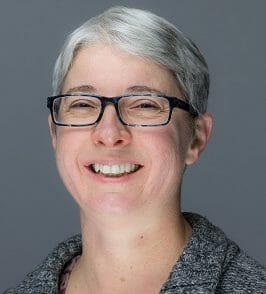 Rue Genger is a researcher in the Urban and Regional Food Systems group at the University of Wisconsin-Madison. Through collaborative networks, the group works with organic and direct-market growers to select vegetable varieties adapted to the Upper Midwest region, build a seed system that serves regional needs and test strategies for sustainable organic vegetable production. Rue’s research focuses on regional seed systems and reducing tillage in organic vegetable production.
Rue Genger is a researcher in the Urban and Regional Food Systems group at the University of Wisconsin-Madison. Through collaborative networks, the group works with organic and direct-market growers to select vegetable varieties adapted to the Upper Midwest region, build a seed system that serves regional needs and test strategies for sustainable organic vegetable production. Rue’s research focuses on regional seed systems and reducing tillage in organic vegetable production.
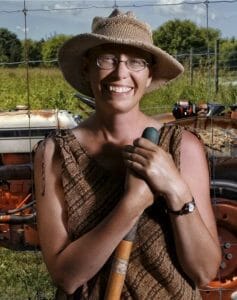 Claire Strader is the organic vegetable educator for Dane County Extension and FairShare CSA Coalition. In this shared position, Claire works with organic vegetable farmers serving direct markets. Her key projects include on-farm research on cover crops and reduced-tillage techniques for organic vegetables, UW-Madison’s Organic Vegetable Farm Manager Registered Apprenticeship and the annual Organic Vegetable Production Conference serving farmers in Wisconsin and surrounding states.
Claire Strader is the organic vegetable educator for Dane County Extension and FairShare CSA Coalition. In this shared position, Claire works with organic vegetable farmers serving direct markets. Her key projects include on-farm research on cover crops and reduced-tillage techniques for organic vegetables, UW-Madison’s Organic Vegetable Farm Manager Registered Apprenticeship and the annual Organic Vegetable Production Conference serving farmers in Wisconsin and surrounding states.
Week 2: Cover Crop-Based Reduced-Tillage Practices in Wisconsin
Tuesday, Aug. 10 | 6-7 p.m.
Presenter: Dylan Bruce
In this recording, see demonstrations and learn about practices related to cover crop-based reduced-tillage vegetable production from Wisconsin farmers. Farmers share their practices and experience with cover crop-based reduce-tillage methods, such as living aisles, crimped or mowed rye and more.
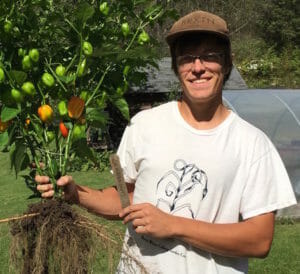 Dylan Bruce works with the UW-Madison Organic and Sustainable Research and Extension lab managing vegetable trials and conducting research to understand and develop environmentally sustainable methods of farming, such as reduced-tillage vegetable production. Dylan also owns and operates Circadian Organics, a certified organic fresh market vegetable and vegetable seed farm. The farm’s mission is to grow delicious, organic produce using methods that support the local ecosystem and community.
Dylan Bruce works with the UW-Madison Organic and Sustainable Research and Extension lab managing vegetable trials and conducting research to understand and develop environmentally sustainable methods of farming, such as reduced-tillage vegetable production. Dylan also owns and operates Circadian Organics, a certified organic fresh market vegetable and vegetable seed farm. The farm’s mission is to grow delicious, organic produce using methods that support the local ecosystem and community.
Week 3: Mulch-Based No-Till Practices
Thursday, Aug. 19 | 4-5 p.m.
Presenters: Mark Quee & Jon Yagla
The Millet Seed is a multi-site urban farm in Iowa City, Iowa, that produces vegetables supplying 20-30 CSA shares each year with no tillage. Mark Quee, farm manager at Scattergood Friends School and experienced organic vegetable farmer, will interview Jon Yagla, farmer at The Millet Seed, about the use of mulch as part of a no-till system.
Jon leads us through his production spaces to demonstrate how he uses leaf mulch in combination with winter-kill cover crops to create a soil rich in organic matter, nutrients and moisture capacity. With a carefully planned production schedule, each space supports multiple crop cycles, as well as cover crops, over the course of the season, maximizing both soil health and productivity.
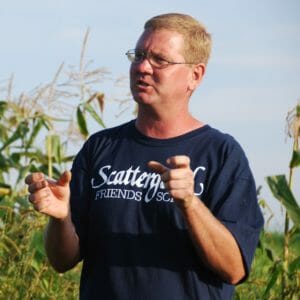 Mark Quee has managed Scattergood Friends School Farm near West Branch, Iowa, for 16 years and is an at-large member of PFI’s board of directors. Mark’s job at Scattergood allows him to nurture his many selves: teacher, lover of books and films, outdoors explorer, organic farmer and one who appreciates living in community.
Mark Quee has managed Scattergood Friends School Farm near West Branch, Iowa, for 16 years and is an at-large member of PFI’s board of directors. Mark’s job at Scattergood allows him to nurture his many selves: teacher, lover of books and films, outdoors explorer, organic farmer and one who appreciates living in community.
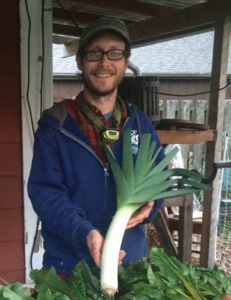 Jon Yagla operates The Millet Seed, an urban farm in Iowa City, Iowa. Since 2016, he has been operating a CSA that supplies a diversity of fruits and vegetables, mushrooms, fermented products, vinegar, cider and other specialty items throughout the season. His vision is to have an urban farm that is truly sustainable and provides a model for others interested in farming without going into debt or relying on heavy machinery and fossil fuels.
Jon Yagla operates The Millet Seed, an urban farm in Iowa City, Iowa. Since 2016, he has been operating a CSA that supplies a diversity of fruits and vegetables, mushrooms, fermented products, vinegar, cider and other specialty items throughout the season. His vision is to have an urban farm that is truly sustainable and provides a model for others interested in farming without going into debt or relying on heavy machinery and fossil fuels.
Week 4: Reduced-Tillage Practices at Humble Hands Harvest and Middle Way Farm
Thursday, Aug. 26 | 6-7 p.m.
Presenters: Hannah Breckbill, Emily Fagan & Jordan Scheibel
In the final event of the series, Hannah Breckbill and Emily Fagan of Humble Hands Harvest, and Jordan Scheibel of Middle Way Farm, share methods, demonstrate practices and give early results of their on-farm research on reduced-tillage methods funded by a Sustainable Agriculture Research and Education (SARE) grant.
Each farm is testing different soil treatments to assess impacts on soil quality, management practices and crop health. At Middle Way Farm, Jordan is testing three treatments: rototilling with regular amendments, compost-only application and a combination of rototilling and compost. The Humble Hands Harvest team is comparing rototilling and compost treatments. Each farm provides virtual tours of their fields and demonstrate techniques for flipping beds from one crop to another.
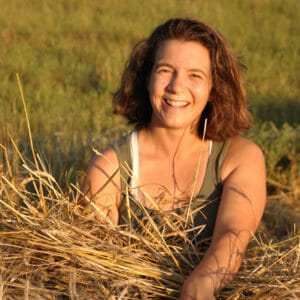 Hannah Breckbill has been farming since 2009 and started Humble Hands Harvest in Decorah, Iowa, in 2013.
Hannah Breckbill has been farming since 2009 and started Humble Hands Harvest in Decorah, Iowa, in 2013.
In 2018, Emily Fagan joined as a partner. The farm sells primarily at farmers markets and through a CSA. Hannah and Emily are developing a perennial polyculture system and incorporating livestock.
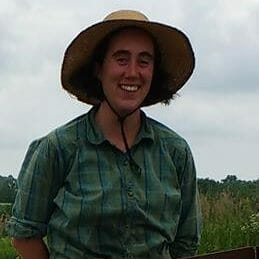 Emily Fagan farms at Humble Hands Harvest in Decorah, Iowa, with her cousin, Hannah Breckbill.
Emily Fagan farms at Humble Hands Harvest in Decorah, Iowa, with her cousin, Hannah Breckbill.
The 2-acre, organic vegetable farm sells to local restaurants, farmers markets and through a CSA. Emily is also a participant in PFI’s Savings Incentive Program.
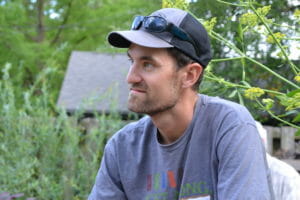 Jordan Scheibel runs Middle Way Farm near Grinnell, Iowa, on the Lacina family farm, where he raises 2 acres of chemical-free vegetables sold primarily through CSA shares and online sales to Grinnell-area residents (population 9,300). Having built his farm reputation through the Grinnell farmers market, in 2020 he chose not to sell at farmers market due to COVID-19, and worked to transition his customers to farm-direct online ordering.
Jordan Scheibel runs Middle Way Farm near Grinnell, Iowa, on the Lacina family farm, where he raises 2 acres of chemical-free vegetables sold primarily through CSA shares and online sales to Grinnell-area residents (population 9,300). Having built his farm reputation through the Grinnell farmers market, in 2020 he chose not to sell at farmers market due to COVID-19, and worked to transition his customers to farm-direct online ordering.
